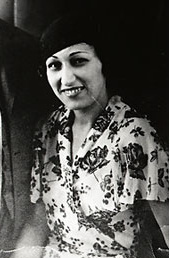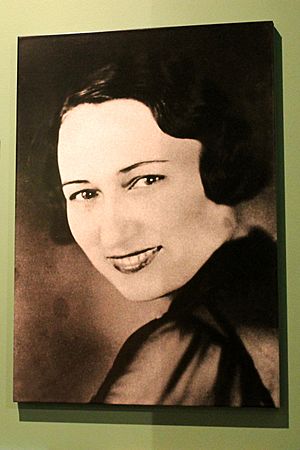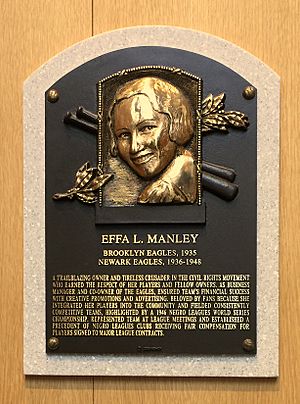Effa Manley facts for kids
Quick facts for kids
Effa Manley
|
|
|---|---|
 |
|
| Born | March 27, 1897 |
| Died | April 16, 1981 (aged 84) Los Angeles, California, U.S.
|
| Occupation | Owner of the Newark Eagles of the Negro leagues |
| Spouse(s) |
|
|
Baseball career |
|
| Career highlights and awards | |
|
|
| Induction | 2006 |
| Election Method | Committee on African-American Baseball |
Effa Louise Manley (born March 27, 1897 – died April 16, 1981) was an important American sports leader. She helped run the Newark Eagles baseball team in the Negro leagues. She owned the team with her husband, Abe Manley, from 1935 to 1948.
Effa Manley was the team's business manager. She also handled many duties for the Negro National League. In 2006, she made history. She became the first woman ever to be put into the National Baseball Hall of Fame. She was chosen for her great work as a baseball executive.
Contents
Early Life and Identity
Effa Manley was born in Philadelphia, Pennsylvania. She went to school there and finished high school in 1916. She learned skills like cooking and sewing. Later, she worked in the hatmaking business.
Effa was raised by her Black stepfather and her mother. She always saw herself as a Black woman. Others also saw her this way. She once shared a funny story about her husband buying her a large engagement ring at Tiffany's. She enjoyed how people were surprised to see an "old Negro man buying this young white girl a five-carat ring."
Leading the Newark Eagles
Effa married Abe Manley in 1935. They met at a New York Yankees game. Abe soon got her deeply involved in running his baseball team, the Newark Eagles. The team was based in Newark, New Jersey.
Effa was very good at marketing the team. She often planned special events that also supported the Civil Rights Movement. Her biggest success was when the Eagles won the Negro World Series in 1946.
She worked hard to make things better for all players in the league. She pushed for better game schedules, higher pay, and nicer places for players to stay. Her team even traveled in a fancy, air-conditioned bus. This was very unusual for Negro league teams back then.
Effa managed the team's daily business. She set up game times, planned travel, and handled the team's money. She bought equipment, worked out player contracts, and managed all the team's advertising. When the Eagles played their first game in 1935, over 185 important people came to watch.
Many future baseball stars played for the Eagles under her ownership. These included Larry Doby, who was the first Black player in the American League. Other famous players were Monte Irvin and Don Newcombe.
Effa Manley believed Negro league teams should be paid when their players joined major league teams. She thought it was fair for them to get money for the talent they developed. For example, the Cleveland Indians paid her $10,000 when Larry Doby joined their team.
Fighting for Change

Effa Manley's influence went beyond baseball. She was very active in the Civil Rights Movement. She was a strong social activist. Before the main Civil Rights Movement, she supported "Don't Buy Where You Can't Work" boycotts.
In 1934, she helped organize a boycott in Harlem. This was against stores that would not hire Black salesclerks. After six weeks, the stores agreed to hire Black workers. By the end of 1935, about 300 stores had Black clerks.
Manley was also the treasurer for the Newark chapter of the National Association for the Advancement of Colored People (NAACP). She often used Eagles games to support important community causes. In 1939, she held an "Anti-Lynching Day" at Ruppert Stadium. She sold "Stop Lynching" buttons to help pass laws against lynching.
During World War II, she arranged for entertainers to perform for Black troops. These troops were stationed at Fort Dix in New Jersey. They were not allowed into segregated USO clubs.
Effa Manley also helped the Booker T. Washington Community Hospital. This hospital trained Black doctors and nurses. The Newark Eagles played many benefit games to raise money for new medical equipment. They also raised money for Black Elks lodges, which were important social groups.
The Eagles worked hard for groups that helped Newark's Black community. A banner at the Baseball Hall of Fame honors the team for helping the Newark Student Camp Fund. Effa also copied a practice from another team. She allowed children to attend games for free. Because of Effa Manley, the Newark Eagles were very important to Black Newark.
Later Life and Legacy
By 1981, Effa Manley's health was not good. She moved into a rest home. She later went to the hospital and was found to have colon cancer. She died on April 16, 1981, after a heart attack. She was buried in Culver City at the Holy Cross Cemetery.
Effa Manley co-wrote a book called Negro Baseball ... Before Integration. This book covered the Negro leagues from 1935 to 1960. Parts of the book also shared her own life story.
In February 2006, Effa Manley was elected to the Baseball Hall of Fame. She was the first woman ever to receive this great honor.
In 2010, a children's book was written about her life. It was called She Loved Baseball: The Effa Manley Story.
Personal Life
Effa Manley was married four times. She did not have any children. Her second husband was Abe Manley. They were married from 1933 until his death in 1952. She later said she regretted her marriages after Abe.
See also
- Women in baseball
 | Emma Amos |
 | Edward Mitchell Bannister |
 | Larry D. Alexander |
 | Ernie Barnes |


